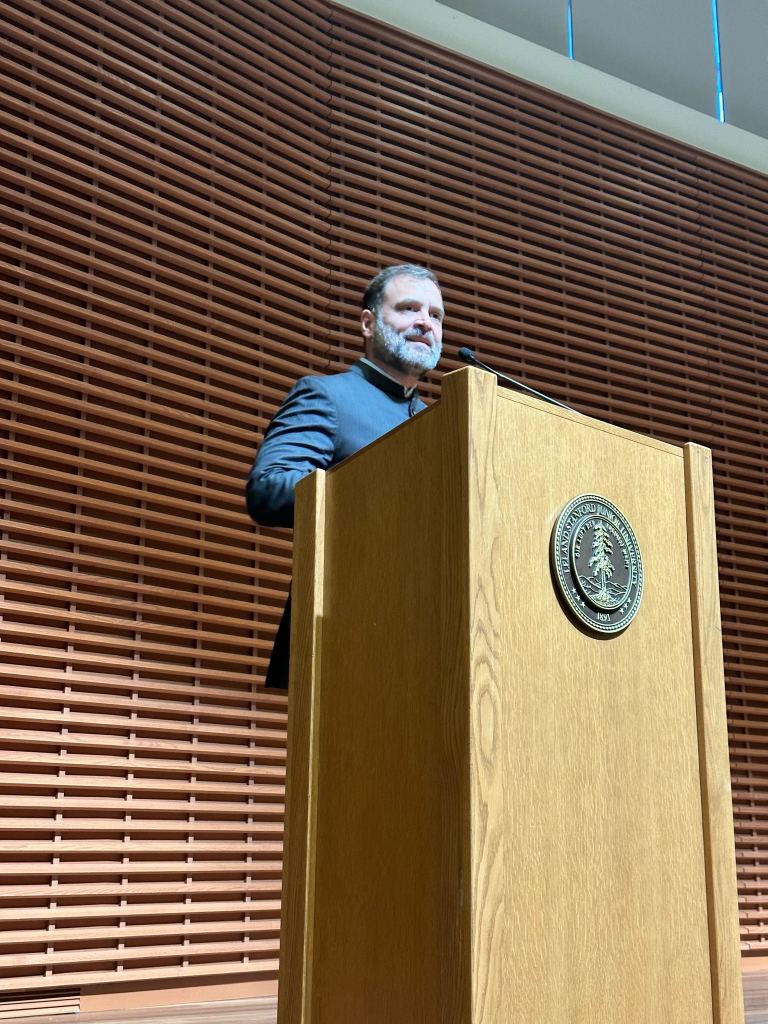“I didn’t think when I joined politics in 2004 I [could have] ever imagined what I see going on in our country.”
Speaking to a full auditorium of close to 600 people, former politician and member of the Indian National Congress Rahul Gandhi visited Stanford on Wednesday and touched on India’s relations with other states and his vision for India’s road to further development.
As the member of an Indian political dynasty, Gandhi carries significant influence among the Indian diaspora. However, in March 2023, he was disqualified from Indian Parliament in claims of defamation for his opposing remarks against the popular Bharatiya Janata Party’s (BJP) leader and current Prime Minister Narendra Modi. The BJP is the largest political party in India and is generally known for its right-wing politics and Hindu nationalist ideology.
Gandhi is the first person to receive a maximum sentence for defamation. “To get the maximum sentence, to be disqualified from Parliament – I didn’t imagine that something like that was possible,” Gandhi said. “But then, I think it’s actually given me a huge opportunity.”
During the moderated portion of the event with Center for Democracy, Developement and Rule of Law (CDDRL) Affiliated Scholar Dinsha Mistree, Gandhi spoke more about India’s relations with the United States.
“I think there is a lot of good work that has been done from the 90’s… I don’t see the acts of imagination. I don’t see the crystallization of a vision,” Gandhi said. “There is military cooperation. That’s fine. That’s important. But it can’t just be military cooperation. “
In speaking of global production, Gandhi imagined a different future for India. Gandhi envisioned a world in which India has the means to advance production capabilities if the country decentralizes its power and allows different ethnic groups to feel comfortable. Gandhi emphasized that India and other democratic states alike must compete against Chinese production, which he claims is an “authoritarian model [that] has got a handle on production.”
“So, production in a democratic environment has to be conceptualized and actioned. And I think India has a central role in that,” Gandhi said. “You have to make [people of different ethnicities] comfortable. You can’t let them feel that their language is threatened or their culture is threatened.”
When asked by Mistree how India could carry out this role, Gandhi responded with a very clear answer: tapping into different markets. By using technology and finance, Gandhi believes that India could make major steps towards building their productive capabilities.
“That’s the mindset change that has to be brought about. India has a large number of skill clusters. But we’re not connecting our clusters with finance. We’re not connecting our clusters with technology. We’re not nurturing the ability to manufacture,” Gandhi said.
In his final statements, Gandhi took a more positive outlook, encouraging transformation and imagination in India. He hopes that India can use power, by being closer to the truth and hearts of people, rather than force in order to bring unity and development to India.
“I think there are difficult times. But there are also times of opportunity. I think there are times when imagination, as I call it, acts of power will resonate and can transform the way we think about ourselves,” Gandhi said.
In speaking of Bharat Jodo Yatra Gandhi’s approximately 2500 mile walk for unity– which took place September 2022 to January 2023– Gandhi recalled the movement with fondness, noting it as “the most beautiful experience of my life so far.”
“When we walked across our country, all of us, it started with 125 people and it fundamentally transformed the way we think about our country, about our people, about our politics,” Gandhi said.
When reflecting on the Indian government’s response to the walk of unity, Gandhi explained his confusion on the lack of military force applied.
“How come? They have all the force. They have all the systems and nothing’s happening. Why for example, are they just not physically stopping us? And this was a question that just kept rotating in my mind,” Gandhi said. “And I realized that force and power are two completely different things.”
While the Indian National Congress faces challenges in opposing the ruling Bharatiya Janata Party, Gandhi remains hopeful in holding power without force. Gandhi repeatedly weaved this idea throughout this speech, claiming that power does not necessitate force.
“Power is an act of imagination. Power is in the present. And power comes when you go close to the truth,” Gandhi said. “The reason we could not be stopped at first was because we were waving around near the truth.”
One comment from engineering student Arman Sharma ‘24 spoke of Gandhi’s unique position in seeking international support at such university talks, while his opposition does not generally take on such endeavors.
“I’m not seeking support from anybody. I’m very clear that our fight is our fight” Gandhi said. “But there is a group of young students from India here, and I want to have a relationship with them, I want to talk to them.”
